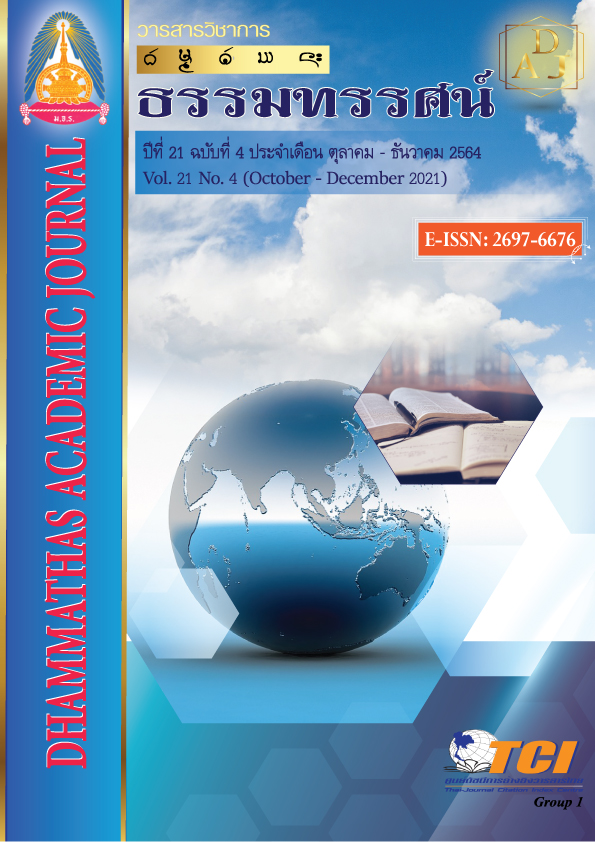Development of Electronic Identification Cards and Reducing Redundancies in Modern Thai Government Relations
Main Article Content
Abstract
The objectives of this research wereto study the problem analyze and Find a way to develop electronic identification cards. It is a descriptive study. By qualitative research method. By using an in-depth interview question form by selecting people with knowledge and understanding divided into 3 groups namely. Group 1 Executives or representatives of central agencies, 5 agencies, 5 persons. Group 2, executives or representatives from the provincial and local governments of Nakhon Ratchasima Province, 5 agencies, 10 persons, and Group 3 Stakeholders of the provincial and local governments in Nakhon Ratchasima Province by group chatting by means of a line group of 5 groups of 20 people. Includes a total of 35 key informants. The tools used for data collection were interview form, semi-structured form. and analyze the data by interpreting it, creating a conclusion.
The results showed that:
1. The problem of legal dimensions, economic dimension, and social dimensions Overall, every aspect of data storage technology is lagging and the cost of the card is high.
2. The analysis found that the main goal to bring A computer system is used to issue ID cards perfectly. The whole system changes the appearance of the card to be modern. and to improve the public service system.
3. Guidelines and recommendations by controlling the card issuance of each government agency Use magnetic strips to record cardholder data. and control card issuing code Produced by the whole computer system People who come to make a card can wait to receive the service immediately.
Article Details
References
กระทรวงการคลัง ฝ่ายจัดการข้อมูลข่าวสาร. (2563). ระบบการจัดการการเงินและการเงินของรัฐบาลอิเล็กทรอนิกส์. เข้าถึงได้จาก http://www1.gfmis.go.th/gfmis_news.html
นิภาพรรณ เจนสันติกุล. (2556). โครงสร้างทางสังคม บทบาทและนโยบายสาธารณะกับความเป็นพลเมือง. วารสารศิลปศาสตร์ มหาวิทยาลัยสงขลานครินทร์ หาดใหญ่, 5(1), 49-62.
บุญทัน ดอกไธสง. (2563). AI for executive leader สำหรับนักบริหารมืออาชีพ. พระนครศรีอยุธยา: มหาจุฬาลงกรณราชวิทยาลัย.
บุรฉัตร จันทร์แดง และคณะ. (2561). นโยบายบัตรสวัสดิการแห่งรัฐกับมาตรการพัฒนาคุณภาพชีวิตผู้มีบัตรสวัสดิการแห่งรัฐ. วารสารรัชต์ภาคย์, 31(13), 1-13.
ศูนย์เทคโนโลยีสารสนเทศและการสื่อสาร สำนักงานปลัดกระทรวงการคลัง. (2563). ระบบบริหารการเงินการคลังภาครัฐแบบอิเล็กทรอนิกส์. เข้าถึงได้จาก http://www.gfmis.go.th/gfmis_news.html
สถาบันวิจัยเพื่อการพัฒนาประเทศไทย. (2563). เมนูคอร์รัปชันและการแสวงหาผลประโยชน์. เข้าถึงได้จาก http://tdri.or.th/wp-content/uploads/2014/10/corruptionmenu-mix-final.pdf
สำนักบริหารการทะเบียน, กรมการปกครอง. (2563). บัตรประจำตัวประชาชน. เข้าถึงได้จาก https://stat.bora.dopa.go.th/card/smartcard1
อำพล จินดาวัฒนะ. (2557). การอภิบาลร่วมสมัย. กรุงเทพฯ: สำนักงานคณะกรรมการสุขภาพแห่งชาติ.
เอกพร รักความสุข. (2559). การวิจัยเชิงคุณภาพ: หลักการและแนวปฏิบัติ. กรุงเทพฯ: เดือนตุลา.
Mia Harbitz, Bettina Boekle-Giuffrida. (2009). Democratic Governance, Citizenship and Legal Identity Linking Theoretical Discussion and Operational Reality. Inter-American Development Bank. New York: NW, Washington D.C., U.S.A.
Praveen Kumar Singh. (2018). Smart Card ID: An Evolving and Viable Technology. International Journal of Advanced Computer Science and Applications, 9(3), 167-179.
Valentina Bali. (2009). Tinkering Toward a National Identification System: An Experiment on Policy Attitudes. The Policy Studies Journal, 37(2), 267-282.

